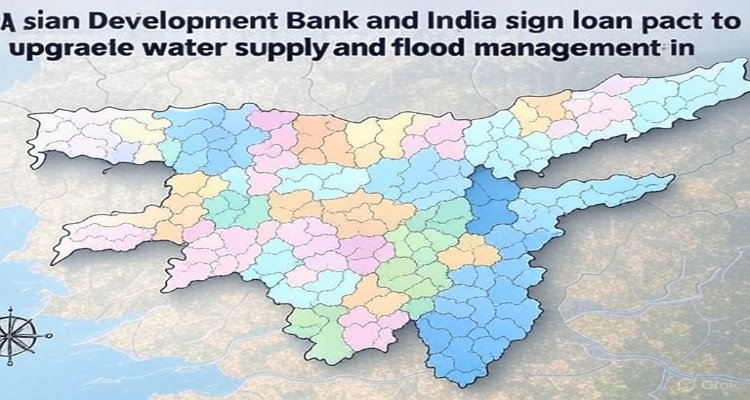India, ADB Sign $125-Million Loan Pact to Upgrade Urban Services in Assam

India and ADB sign a $125M loan pact to upgrade urban services in Assam, boosting water supply, flood management, and climate resilience for 360,000 residents.
Introduction
In a move aimed at transforming urban infrastructure in Northeast India, the Government of India and the Asian Development Bank (ADB) have signed a $125-million loan agreement to upgrade water supply, improve flood management, and strengthen urban governance in Assam. The initiative is projected to benefit nearly 360,000 residents across six districts and Guwahati, enhancing both the quality of daily life and the region’s resilience to climate challenges.
Context and Background
Urban development in Assam has long been constrained by inadequate infrastructure, seasonal floods, and rapid population growth concentrated in urban centres like Guwahati. Access to safe, reliable water supply remains inconsistent, while monsoon flooding continues to strain drainage systems and disrupt lives.
Recognizing these challenges, ADB has been working closely with India for decades to strengthen climate resilience and enhance urban planning. India, a founding member of the bank and one of its largest beneficiaries, has leveraged ADB’s financing to push forward projects in renewable energy, transportation, and water resource management. In Assam, ADB’s focus is shifting towards projects that combine people-centric development with long-term environmental sustainability.
Main Developments in Assam
The $125-million urban services project will take shape across the district headquarters of Barpeta, Bongaigaon, Dhubri, Goalpara, Golaghat, and Nalbari, as well as Guwahati city.
Key highlights include:
-
Water Supply Systems: Six water treatment plants with a combined daily capacity of 72 million litres will be constructed, alongside 800 kilometres of distribution pipelines. The initiative ensures that residents of the participating districts receive continuous, metered water supply.
-
Storm Water and Drainage Management: In flood-prone Guwahati, the project seeks to overhaul drainage systems in the Bahini Basin with flood diversion channels, upgraded pipelines, and a nature-based retention pond that will help reduce flood discharge while boosting groundwater recharge.
-
Smart Monitoring: Deployment of real-time monitoring technology will be used to track system efficiency and maintain non-revenue water (leakage and wastage) below 20 percent, addressing both sustainability and accountability.
-
Institutional Reforms: Beyond infrastructure, the project prioritises training and capacity building within urban governance institutions to ensure strong project implementation and long-term sustainability.
Expert Insight and Public Reaction
According to urban development experts, the project marks a significant step in addressing the twin threats of water scarcity and urban flooding in the Northeast.
Dr. R. Sharma, an independent urban policy analyst, noted that “Assam’s development challenge has always been balancing rapid urban growth with ecological realities. ADB’s financing model combines both — infrastructure expansion with climate adaptation — which could become a blueprint for other states.”
Local community leaders have also welcomed the project, particularly in Guwahati, where annual flooding leads to property losses and public health risks. Residents hope that the integration of a retention pond and modern drainage systems will lessen their vulnerability during the monsoon season.
Impact and Implications
For Assam, the project represents more than infrastructure—it signals a shift towards climate-resilient urban planning. The long-term benefits of this agreement include:
-
Improved Public Health: Access to continuous safe water supply will reduce the incidence of waterborne diseases, currently a pressing problem in low-lying districts.
-
Climate Resilience: Nature-based solutions in Guwahati and advanced water management infrastructure will help mitigate the severe impact of floods on both urban economies and households.
-
Institutional Strengthening: By embedding reforms and training, the initiative strengthens state and municipal capacities, ensuring urban development projects in the future are efficiently managed.
-
Economic Growth: Reliable water infrastructure is directly linked with business productivity and investment flows. Stable urban services are expected to attract private sector growth in Assam.
At a broader level, the project underscores ADB’s commitment to India’s climate-resilient development path. In 2024 alone, the bank financed $4.25 billion worth of projects in India, with over 60 percent supporting mitigation and adaptation efforts.
Conclusion
The $125-million partnership between the Government of India and the Asian Development Bank signals a transformative chapter in Assam’s urban journey. By blending infrastructure upgrades with sustainability and governance reforms, the project seeks to build cities that are not only livable today but also resilient against tomorrow’s climate uncertainties. For residents of Assam, this step offers hope for a future where safe water and secure urban settlements are no longer aspirations but everyday realities..
Disclaimer :This article is based on officially released information and independent analysis. It is intended for informational purposes only and does not represent financial or investment advice.











Thanks for sharing. I read many of your blog posts, cool, your blog is very good.